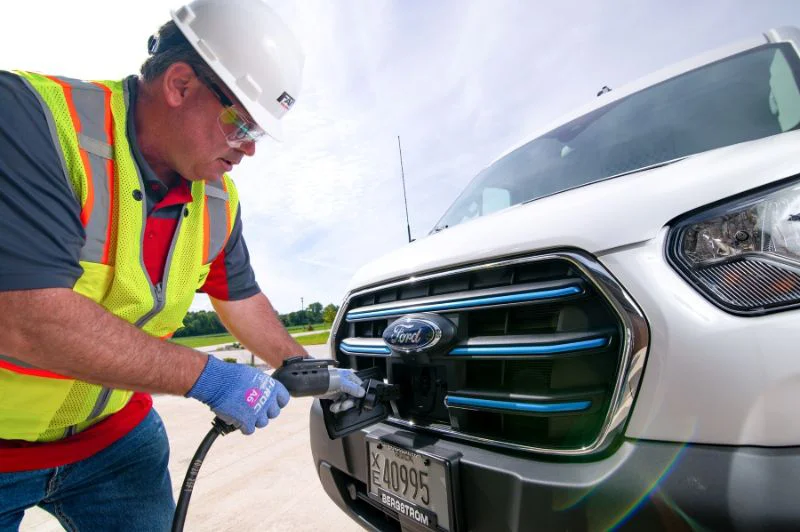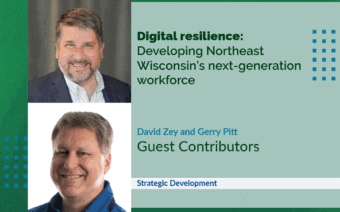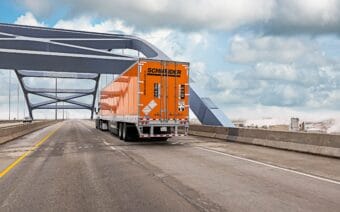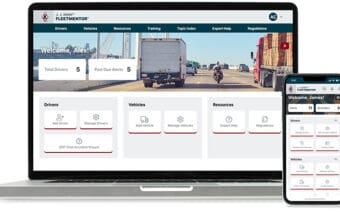
October 7, 2022
MENASHA – Electric vehicle (EV) technology continues to fill conversations throughout the country as many companies contemplate whether or not to electrify their light-, medium- or heavy-duty fleets – including right here in Northeast Wisconsin.
EnTech Solutions, a division of Faith Technologies Incorporated (FTI) located in Menasha, is holding its own in the global industry as it provides distributed energy capabilities, eMobility charging, sustainable fuel technologies and asset management for businesses looking for clean energy options.
“We’ve worked with several companies,” Wade Leipold, vice president of solutions at EnTech Solutions, said. “We’ve worked with food and beverage companies. We’ve worked with some delivery companies. We’ve done quite a bit of work with dealerships also. So quite a wide variety of customers.”
Leipold said EnTech helps guide customers through that “end-to-end process.”
“We work with customers starting up front with that assessment phase – understanding where the customers are in their electrification journey,” he said. “What they’re looking at as far as vehicles, how they will be using those vehicles… What energy use would look like for charging? We’ll go through a detailed design process. Do all the permitting that’s required and then the full installation, commissioning startup and even ongoing maintenance and support of that charging solution.”
Leipold said the most important step in the whether-or-not-to-switch-to-electric process is creating a plan.
“Understanding the usage of your vehicles – the (electric) vehicles today have specific ranges,” he said. “So, making sure you start upfront with what that plan is – when you’d be looking at getting the vehicle, identifying the correct vehicle that fits the charging profiles (you plan to use) and the overall range for that vehicle.”
The unknown
Leipold said those in the electric vehicle industry acknowledge there are a lot of emotions and unknowns involved.
“One of the things we wanted to make sure (we did) is walk the talk so we understand what our customers and clients are going to be going through so we can better work with them and better provide the value the customer is looking for,” he said in regards to FTI’s transition to electric vehicles. “We did an assessment of all of our vehicles – we have 300-plus vehicles within our fleet. We ran data on all those vehicles to understand how long each one of those were being driven.”
?

Wade Leipold is the vice president of solutions at EnTech Solutions, a division of Faith Technologies Incorporated. Submitted Photo
?Leipold said part of this also involves employee buy-in.
“Even though our drivers aren’t buying the vehicle, it’s an emotional change for them – it’s a different driving experience,” he said. “So, having that upfront conversation with our employees to let them know what they may expect. You need to make sure your employees are willing to work with you through that.”
‘A really good time’ to go electric
Leipold said he thinks now is a “really good time” to look at moving toward electrification for several reasons.
“I think regulations are a big thing to take into account – What does that future look like and what will that industry be looking at as they continue forward?” he said. “Starting some of that pre-planning now (so you are in line with them when they are implemented). And then the advantages… First off, there are lower service costs – oil changes, your braking systems typically last longer with regenerative braking that’s available in these vehicles. So, at the end of the day, you end up looking at tires and washer fluid as opposed to the many other mechanical and movable parts and vehicles nowadays.”
Leipold said another benefit is a reduction in overall fuel costs.
“When you take a look at the cost of gasoline to the cost of electricity, it typically is quite a reduction in what it costs to drive the same distance between gas and electric,” he said.
Leipold said in addition, there are some grants and incentives available to qualifying companies that may make the switch worthwhile.
“That’s something we work with our customers and clients on, so they understand that,” he said. “We do grants and incentive study for each of our customers and take advantage of federal, state and even local and municipal type monies that may be available to them on their journey to electrification.”
A noticeable increase
Leipold said EnTech has witnessed an uptick in interest in electrification year after year.
“I’ve been working on this since 2020, which is when we formally kicked off the program,” he said. “We’ve been installing chargers for many years before that but putting in dedicated teams and driving electrification solutions (started in 2020).”
Leipold said right now, most conversations center around education.
“We have many customers and clients who are piloting certain areas and getting a better understanding of what EV electrification means for their particular business,” he said. “But year over year, over year, it’s exponential growth.”
Leipold said at this rate, “we’re at the outside quarter of that hockey stick, and substantial growth is coming over the next five years.”
“I think this is predicated on the grants and incentives that are out there,” he said, “but also the commitments from the major auto and truck manufacturers that are out there and the commitments that by 2035, 2040 going all electric. There will not be many other choices out there within the next 20 years, from what we see right now, other than to go electric.”
Leipold said when EnTech began its push, much of its work focused on the West Coast.
“That’s a mature market when you look at electrification, but there’s been transitioning to the east over the past couple of years and we’re starting to see a lot more interest in Wisconsin,” he said. “Even in Northeast Wisconsin, some of the major companies that are right in our backyard have initiatives around… electrification to help meet some of their sustainability and environmental goals.”
On the cutting edge of technology
Leipold said charging station options are another important conversation companies need to have when discussing a move to electrification.
“There are probably three main legs to the stool when we take a look at it overall,” he said. “The overall cost of the solution. Sustainability – what are the sustainability goals of our customers and clients? Then resiliency – how important is that to them to make sure they always have the availability to charge.”
Leipold said EnTech can simulate overall costs.
“We can model and simulate what their electric bills would look like,” he said. “We can also simulate what it would look like if they would add solar, or if they would add battery energy storage. We can let them know what the carbon offset would be. We can also let them know what the total cost of ownership would be and what the return on investment is.”
Leipold said all of that can vary depending on customer needs.
“Where they are on that spectrum a lot of times depends on how many vehicles (they have),” How big of chargers (they need) and what is that going to look like. What is the utility going to be able to provide them and what is the current capacity of their electrical distribution for their facility?”
?

EnTech’s fully renewable, off-grid charging stations can help reduce overall EV charging utility costs. Submitted Photo
?Leipold said most EV chargers still pull power from the main power grid, which means they still utilize fossil fuels because that is what is used to create traditional power.
“That typically includes a usage charge and maybe a demand charge based on the business and what tariffs that business is under,” he said. “You also would be subject to any potential outages.”
Leipold said EnTech can provide its customers with main power grid connections but offers its fully renewable, off-grid options as well.
“We consider them to be islandable mobile charging solutions,” he said. “So, they can be on-grid or off-grid and try to use the lowest cost, most efficient, best value electrons at any given time. And what that does is help reduce overall utility costs.”
Local impact
As a Wisconsin native, Leipold said he’s proud to work with a local company that is on the cutting edge of the EV charging industry.
“I love to see this technology is coming out of Northeast Wisconsin,” he said. “I love to see we’re able to provide value. I think we can create great jobs and great experiences for the community in this area.”
Being at the forefront of technology, Leipold said, puts Northeast Wisconsin in a good place.
“This is where everybody is pushing to, or will need to get to, and we will be at the forefront of that for Northeast Wisconsin being able to provide those solutions,” he said. “We also have a national reach, a national footprint and work with some of the biggest customers and businesses within the U.S.”
 ‘Walking the walk’ for more than a decade
‘Walking the walk’ for more than a decade 4imprint completes 170,000-square-foot expansion
4imprint completes 170,000-square-foot expansion








